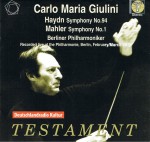
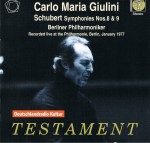
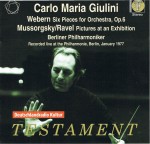
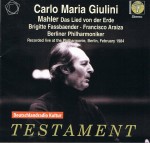 TESTAMENT is the prestigious British company that licenses recordings of significant performances that are held in the archives of EMI, Decca, RCA, the BBC and other radio archives. Testament released their first disc in 1990, restoring to circulation two esteemed performances of Brahms: the Horn Trio in E flat op.40 with Aubrey Brain, Adolph Busch, and Rudolph Serkin recorded in 1933 and the Clarinet Quintet with Reginald Kell and the Busch Quartet from 1937 (SBT 1001). 21 years later, Testament, essentially artist-based, continues to liberate valuable performances from record company archives and issue them, many for the first time. Their very few DVDs include the legendary videos of Toscanini and the NBC Symphony transmitted livebetween March 20, 1948 and March 22, 1952. These black and white kinescopes from studio 8H and Carnegie Hall were once available on RCA laser discs and are now licensed to Testament (SBDVD 1003-1007, 5 DVDs available separately). They also offer many vinyl re-issues from the EMI’s LP catalogue in superior new pressings. Their recent releases include five CDs of Carlo Maria Giulini conducting the Berlin Philharmonic in live concerts from the Philharmonie, as recorded by Deutschlandradio Kultur. Giulini was Music Director and conductor of the Los Angeles Philharmonic from 1976 to 1982 and these Berlin performances from that era find Giulini still at the top of his interpretative and conducting abilities. During these years while the Berlin Philharmonic Orchestra was still von Karajan’s, the interpretations are Giulini’s. As these are live performances they let us “attend” these joyful events in which it is clear that the conductor’s conceptions, from very subtle shadings and nuances to expansive climaxes, are delivered with a sureness of playing and ensemble that is a tribute to everyone involved. It’s such a refreshing pleasure to hear performances of this calibre. The sound is nothing short of astounding being crystal-clear, more dynamic than the sound from a broadcast, plus realistic front to back perspective. The first of the four releases is a 2CD set of the Haydn Surprise Symphony coupled, as it was in the concert in February 1976, with an radiant, extroverted reading of the Mahler First (SBT2 1462, 2 CDs specially priced). A must have. The Schubert Eighth and Ninth from February 1977 (SBT1463) are followed by a brilliant concert from January 1977 in which Pictures at an Exhibition is preceded by Webern’s Six Pieces for Orchestra, opus 6 (SBT1464). From February 1984 Giulini conducts Das Lied von der Erde with Brigitte Fassbaender and Francisco Araiza (SBT1465). Conductor and soloists seem to have been on tour with this work and, in fact, recorded it with the BPO for DG... however every performance is unique and this one has its felicities.
TESTAMENT is the prestigious British company that licenses recordings of significant performances that are held in the archives of EMI, Decca, RCA, the BBC and other radio archives. Testament released their first disc in 1990, restoring to circulation two esteemed performances of Brahms: the Horn Trio in E flat op.40 with Aubrey Brain, Adolph Busch, and Rudolph Serkin recorded in 1933 and the Clarinet Quintet with Reginald Kell and the Busch Quartet from 1937 (SBT 1001). 21 years later, Testament, essentially artist-based, continues to liberate valuable performances from record company archives and issue them, many for the first time. Their very few DVDs include the legendary videos of Toscanini and the NBC Symphony transmitted livebetween March 20, 1948 and March 22, 1952. These black and white kinescopes from studio 8H and Carnegie Hall were once available on RCA laser discs and are now licensed to Testament (SBDVD 1003-1007, 5 DVDs available separately). They also offer many vinyl re-issues from the EMI’s LP catalogue in superior new pressings. Their recent releases include five CDs of Carlo Maria Giulini conducting the Berlin Philharmonic in live concerts from the Philharmonie, as recorded by Deutschlandradio Kultur. Giulini was Music Director and conductor of the Los Angeles Philharmonic from 1976 to 1982 and these Berlin performances from that era find Giulini still at the top of his interpretative and conducting abilities. During these years while the Berlin Philharmonic Orchestra was still von Karajan’s, the interpretations are Giulini’s. As these are live performances they let us “attend” these joyful events in which it is clear that the conductor’s conceptions, from very subtle shadings and nuances to expansive climaxes, are delivered with a sureness of playing and ensemble that is a tribute to everyone involved. It’s such a refreshing pleasure to hear performances of this calibre. The sound is nothing short of astounding being crystal-clear, more dynamic than the sound from a broadcast, plus realistic front to back perspective. The first of the four releases is a 2CD set of the Haydn Surprise Symphony coupled, as it was in the concert in February 1976, with an radiant, extroverted reading of the Mahler First (SBT2 1462, 2 CDs specially priced). A must have. The Schubert Eighth and Ninth from February 1977 (SBT1463) are followed by a brilliant concert from January 1977 in which Pictures at an Exhibition is preceded by Webern’s Six Pieces for Orchestra, opus 6 (SBT1464). From February 1984 Giulini conducts Das Lied von der Erde with Brigitte Fassbaender and Francisco Araiza (SBT1465). Conductor and soloists seem to have been on tour with this work and, in fact, recorded it with the BPO for DG... however every performance is unique and this one has its felicities.
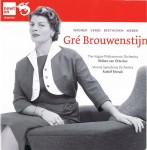
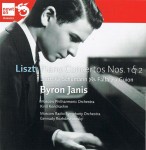
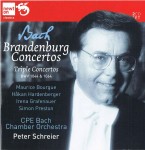
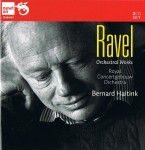 NEWTON Classics is a recent arrival on the reissue scene. Since their start-up in 2009 their CD releases have been judiciously selected primarily from the Philips archives. The Dutch lyric-dramatic soprano Gré Brouwenstijn has been a long time favourite, as heard in so many complete operas from Beethoven to Wagner. Eminently recommendable is her eponymous CD of arias by Wagner, Verdi, Weber and Beethoven containing recordings from 1952 and 1956 conducted by Willem van Otterloo and Rudolf Moralt (Newton 8802061). Byron Janis’s steel-fingered performances of the two Liszt concertos recorded in Moscow in 1962 by Mercury for their Living Presence series have lost none of their impact. Seven solo pieces by Schumann, Falla, Liszt and Guion complete this audiophile favourite (8802061). Peter Schreier is not only a notable tenor of opera and lieder fame, he is also a conductor of note. The 1992 recordings of the Brandenburgs by the Kammerorchester Carl Philip Emanuel Bach are conducted with refreshing panache matched by a sparkling recording. Add two triple concertos, BWV1044 & 1064 and the package is hard to resist (8802075). Saving the best ‘till last, the incomparable Ravel/Haitink/Concertgebouw 2CD set, once available on a Philips DUO, makes a most welcome return (8802068, 2CDs). All the Ravel showpieces are here; Bolero, La Valse, Rapsodie Espagnole, Le Tombeau de Couperin, Valses nobles et sentimentales, Ma Mère l’Oye, Menuet Antique, Daphnis et Chloé Suite no.2, and, of course, Alborada del Gracioso and Pavane pour une infant dèfunte. These are all vital, beautifully shaded performances captured in outstanding sound. The Bolero enjoys a rousing performance unequalled in its IMPACT... this would have provided a total workout for Ida Rubinstein, the ballerina for whom the piece was written. Welcome back to this premier collection.
NEWTON Classics is a recent arrival on the reissue scene. Since their start-up in 2009 their CD releases have been judiciously selected primarily from the Philips archives. The Dutch lyric-dramatic soprano Gré Brouwenstijn has been a long time favourite, as heard in so many complete operas from Beethoven to Wagner. Eminently recommendable is her eponymous CD of arias by Wagner, Verdi, Weber and Beethoven containing recordings from 1952 and 1956 conducted by Willem van Otterloo and Rudolf Moralt (Newton 8802061). Byron Janis’s steel-fingered performances of the two Liszt concertos recorded in Moscow in 1962 by Mercury for their Living Presence series have lost none of their impact. Seven solo pieces by Schumann, Falla, Liszt and Guion complete this audiophile favourite (8802061). Peter Schreier is not only a notable tenor of opera and lieder fame, he is also a conductor of note. The 1992 recordings of the Brandenburgs by the Kammerorchester Carl Philip Emanuel Bach are conducted with refreshing panache matched by a sparkling recording. Add two triple concertos, BWV1044 & 1064 and the package is hard to resist (8802075). Saving the best ‘till last, the incomparable Ravel/Haitink/Concertgebouw 2CD set, once available on a Philips DUO, makes a most welcome return (8802068, 2CDs). All the Ravel showpieces are here; Bolero, La Valse, Rapsodie Espagnole, Le Tombeau de Couperin, Valses nobles et sentimentales, Ma Mère l’Oye, Menuet Antique, Daphnis et Chloé Suite no.2, and, of course, Alborada del Gracioso and Pavane pour une infant dèfunte. These are all vital, beautifully shaded performances captured in outstanding sound. The Bolero enjoys a rousing performance unequalled in its IMPACT... this would have provided a total workout for Ida Rubinstein, the ballerina for whom the piece was written. Welcome back to this premier collection.
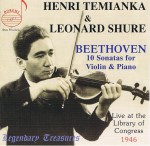 DOREMI, another artist-driven label, has meticulously restored historic recordings for 17 years. Their catalogue embraces performances of works of every size and genre from every period, from early music to a lone South American 20th century guitarist. DOREMI is well known for performances by famous and not-so-famous violinists and pianists. Of course, in this as in any other business, the consumer rules, necessitating recordings by artists for which there is a waiting, world-wide market while at the same time rediscovering and resurrecting major talents that are all but forgotten today, even by some collectors. Their recent set of the Beethoven 10 Violin Sonatas is a notable, if not colossal contribution in this direction (DHR-8011-3, 3 CDs). The performances on this set reconfirm that violinist Henri Temianka and pianist Leonard Shure were among the very finest musicians of the 20th century. Temianka was clearly in the league of Heifetz and Milstein and Shure was similarly among the great talents, Arrau and Serkin. Oddly enough, though both Temianka and Shure had flourishing solo careers, their recording legacies are regrettably few in number. As a young man Temianka achieved international fame when he won the Third Prize in the 1935 Wieniawski Violin Competition in Warsaw; the second went to David Oistrakh, the first to Ginette Neveu. Later he played Prokofiev accompanied by the composer. He was active in England in the 1930s and made recordings for Parlophone. In 1946 Temianka founded the Paganini Quartet, in which each of its members played a Strad that had once been owned by Paganini. The Quartet was well known for many years in the mid-century and was the house quartet of RCA Victor. Just before that he had been invited by Elizabeth Sprague Coolidge to perform the complete Beethoven Violin Sonatas with Leonard Shure in the Elizabeth Coolidge Auditorium in the Library of Congress ... and here are those performances from January and February 1946, originally preserved on acetates and now on CD. Driven by a labour of love, it took Jacob Harnoy months of meticulous restoration to transfer the product of that old technology, which while inherently subject to surface noise, clicks and skips, did maintain the luminosity and beauty of Temianka’s playing. His violin sings and his intonation and technique are impeccable. The revelation of hidden beauties is a joy. Broadly speaking, the outer movements are taken at energetic brisk tempos while the slow movements are expressive in a way that penetrates the soul. If you have more than a passing interest in this repertoire, you owe it to yourself to hear these exceptional performances.
DOREMI, another artist-driven label, has meticulously restored historic recordings for 17 years. Their catalogue embraces performances of works of every size and genre from every period, from early music to a lone South American 20th century guitarist. DOREMI is well known for performances by famous and not-so-famous violinists and pianists. Of course, in this as in any other business, the consumer rules, necessitating recordings by artists for which there is a waiting, world-wide market while at the same time rediscovering and resurrecting major talents that are all but forgotten today, even by some collectors. Their recent set of the Beethoven 10 Violin Sonatas is a notable, if not colossal contribution in this direction (DHR-8011-3, 3 CDs). The performances on this set reconfirm that violinist Henri Temianka and pianist Leonard Shure were among the very finest musicians of the 20th century. Temianka was clearly in the league of Heifetz and Milstein and Shure was similarly among the great talents, Arrau and Serkin. Oddly enough, though both Temianka and Shure had flourishing solo careers, their recording legacies are regrettably few in number. As a young man Temianka achieved international fame when he won the Third Prize in the 1935 Wieniawski Violin Competition in Warsaw; the second went to David Oistrakh, the first to Ginette Neveu. Later he played Prokofiev accompanied by the composer. He was active in England in the 1930s and made recordings for Parlophone. In 1946 Temianka founded the Paganini Quartet, in which each of its members played a Strad that had once been owned by Paganini. The Quartet was well known for many years in the mid-century and was the house quartet of RCA Victor. Just before that he had been invited by Elizabeth Sprague Coolidge to perform the complete Beethoven Violin Sonatas with Leonard Shure in the Elizabeth Coolidge Auditorium in the Library of Congress ... and here are those performances from January and February 1946, originally preserved on acetates and now on CD. Driven by a labour of love, it took Jacob Harnoy months of meticulous restoration to transfer the product of that old technology, which while inherently subject to surface noise, clicks and skips, did maintain the luminosity and beauty of Temianka’s playing. His violin sings and his intonation and technique are impeccable. The revelation of hidden beauties is a joy. Broadly speaking, the outer movements are taken at energetic brisk tempos while the slow movements are expressive in a way that penetrates the soul. If you have more than a passing interest in this repertoire, you owe it to yourself to hear these exceptional performances.



